Coordination
Background
Effective coordination can prevent gaps and overlaps in humanitarian responses, ensure the impact of CVA is optimised for the benefit of crisis affected populations, whilst also making the most of limited humanitarian funding. But the CALP Network’s State of the World’s Cash report found that cash coordination is seen as weak and ad hoc, and that this is having serious operational impact.
Ninety-five donors, international and national NGOs, private sector actors and one UN agency have called for clarity on two key issues surrounding cash coordination:
- Who should be accountable for ensuring effective cash coordination, and
- What the scope of Cash Working Groups should be, including in relation to multipurpose cash.
We urgently need to build on what works and provide clarity at the global level on the questions above, whilst adapting to different contexts. Clear decisions based on the impact on affected populations rather than agency politics are long overdue.
Current priorities
We aim to contribute to progress on this issue on three levels: supporting Cash Working Groups at the regional level; contributing to practical solutions for cash coordination at the global level; and convening evidence-based discussion on the key issues, highlighting critical decision points and opportunities for progress.
Featured content

Cash Coordination – LIVE timeline
Page
The latest updates on cash coordination as they unfold.

95 Organisations Sign Letter Calling for Strengthened Cash Coordination
News
Today a letter signed by 95 organisations was handed into the Emergency Relief Coordinator (ERC) urging the Inter-Agency Standing Committee (IASC) to take a decision on the leadership and scope of cash coordination in the coming year.

Is cash transforming the humanitarian system or is the system limiting how cash is used?
Blog Post
At the State of World’s Cash 2020 launch event, Sorcha O’Callaghan, Director of Humanitarian Policy Group at ODI warned that, “Cash offers a huge transformative potential, but as far as the system is privileging the interest of the agencies over people in crisis, we won’t be able to see it”. If you missed the State of the World's Cash 2020 launch we're sharing highlights. Quote 4...
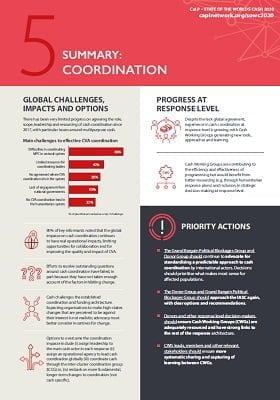
State of the World’s Cash 2020 Chapter 5 summary: Coordination
Report
There has been very limited progress on cash coordination since 2017. Cash continues to challenge the established coordination and funding architecture, and efforts to resolve outstanding questions around cash coordination have failed. Despite the lack of global agreement, Cash Working Groups are pushing forward and contributing to improved programming, and generating new approaches. This...

Cash Coordination Tip Sheet
Guidelines and Tools
This tip sheet sets out established best practice, key guidance and resources for all aspects of cash coordination, intended as a clear, accessible and action-oriented guide for those engaged in coordination of cash and voucher assistance (CVA) at the field level.

Introducing the Cash Coordination Tip Sheet
Webinar
The CALP Network has developed a tipsheet setting out established best practice and key guidance and resources for all aspects of cash coordination, intended as a clear, accessible and action-oriented guide for those engaged in coordination of cash and voucher assistance at the field level.

Cash Coordination: A proposal from members in MENA
Blog Post
Earlier this year the CALP Network undertook regional consultations to explore options for cash coordination. This blog lays out recommendations from participants from the Middle East and North Africa who sketched out what cash coordination, and coordination more broadly, could look like in future to support a more effective, efficient and accountable response.
Thematic lead
Latest

Water Access by Voucher
Report
This document presents an overview of the use of vouchers to connect vulnerable people in Somalia with water during an emergency response. The document provides thorough and practical guidance to implementing a water voucher programme, covering all phases of the project cycle including: programme...

IASC Evaluation of the Humanitarian Response in South Central Somalia 2005-2010
Case Study
This independent report presented by DARA confirms that humanitarian aid in Somalia has saved thousands of lives between the years 2005 to 2010. The report is based on an evaluation of the humanitarian response in south-central Somalia and is one of the most comprehensive evaluations of aid in Somalia...
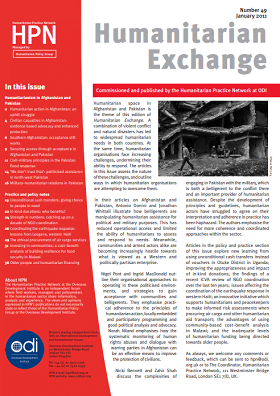
Humanitarian Exchange No. 49: Unconditional cash transfers: Giving choice to people in need
Report
This article in Humanitarian Exchange magazine (article begins on page 19) explains how Action Against Hunger has moved towards unconditional cash grants as a food security and livelihoods response in Northern Uganda. The article describes the technical features of the programme (transfer amount,...
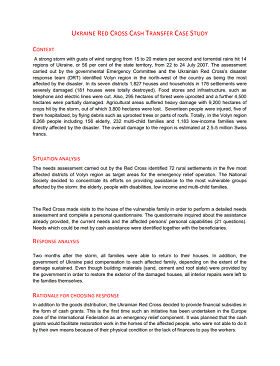
Ukraine Red Cross cash transfer case study
Case Study
This case study examines the first ever Red Cross cash transfer initiative in the European Zone of the International Federation, as part of a home restoration programme in Ukraine following a devastating storm. The report details response analysis, rationale, programme summary, perceived impacts and...
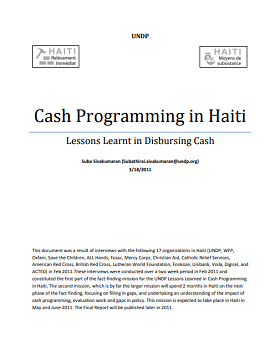
Cash Programming in Haiti – Lessons Learned in Disbursing Cash
Report
The following report is the result of an initial 2 week mission to Haiti to investigate cash programming (including cash for work) amongst 17 organizations. It is not intended as an exhaustive review of 17 organizations’ practices, but attempts to look at what were some of the critical stages in cash...
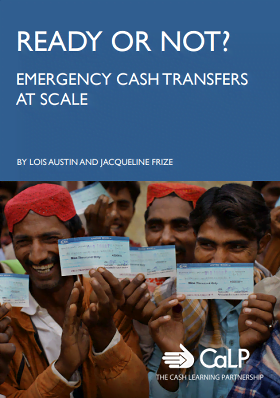
Ready or not? Emergency cash transfers at scale
Report
Whilst there is significant experience of implementing cash transfer programmes (CTP) in emergencies this has seldom been at a scale comparable to in-kind responses. A number of critical gaps and blockages standing in the way of scaled up programming in the wake of a disaster have been identified...

Hard Cash in Hard Times: Cash transfers versus food aid in rural Zimbabwe
Case Study
This case study looks at Concern Worldwide’s pilot project to provide cash, instead of traditional food aid, to food insecure communities in Zimbabwe. The document briefly describes the conditions making it suitable for such a response, positive outcomes for the cash recipients, the cost effectiveness,...

Cash Learning Bulletin August 2011
Report
This newsletter includes articles and updates on: Smart cards used for the first time in Zimbabwe cash transfers Philippines cash learning group starts up Technical forum on cash transfers in Kenya & Somalia CALP Ivory Coast cash guidelines and details of forthcoming research for the period.

Cash transfer programming in emergencies: The Cash Learning Partnership’s 5th Global Learning Event
Report
The CALP Network’s 5th Global Learning Event was organised in partnership with the International Federation of Red Cross and Red Crescent Societies (IFRC). The learning event took place in Nairobi, Kenya, and focused on three topics of emerging importance not only to cash transfer programming, but to...
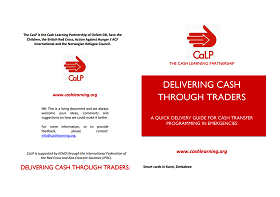
Delivering Cash Through Traders – A Quick Delivery Guide (booklet)
Guidelines and Tools
A Quick Delivery Guide to delivering money through local traders. Prepared as a practical tool, this guide provides a brief synthesis of the necessary preconditions and advantages and disadvantages of using cheques. It also provides practical implementation tips. This version of the Quick Delivery...
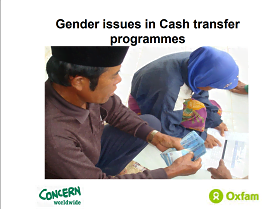
Gender issues in Cash transfer programmes
Presentation
Purpose of the study: To assess the changes in gender power relations within households and in the community, as a result of emergency cash transfer programmes. To review the processes followed by agencies in emergency cash transfer programming and analyse their adequacy from a gender perspective
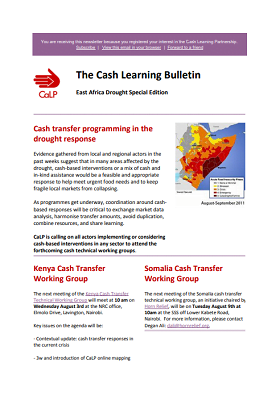
Cash Learning Bulletin: East Africa drought special edition
Report
A CALP Network bulletin with articles and information on: Cash transfer programming in the drought response Kenya Cash Transfer Working Group Somalia Cash Transfer Working Group Training on Cash Transfers in Emergencies and a list of appropriate links and resources.
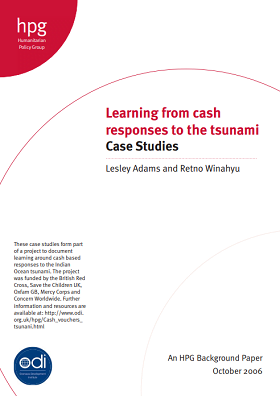
Learning from Cash Responses to the Tsunami: Case Studies
Case Study
These case studies form part of a project to document learning around cash based responses to the Indian Ocean tsunami. The project was funded by the British Red Cross, Save the Children UK, Oxfam GB, Mercy Corps and Concern Worldwide.
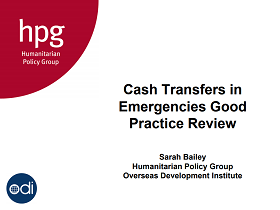
Cash Transfers in Emergencies Good Practice Review: Presentation
Presentation
Powerpoint presentation on the then-forthcoming Good Practice Review on cash transfer programming in emergencies.
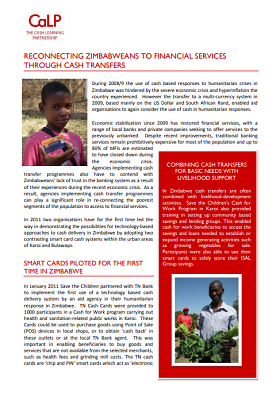
The CALP Network Newsletter supplement Zimbabwe cards Aug 11
Report
Supplement to the CALP Network August 2011 newsletter, focusing on the topic of ‘Reconnecting Zimbabweans to financial services through cash transfers’. Includes sections on: Piloting of smart cards in Zimbabwe Combining cash transfers for basic needs with livelihood support
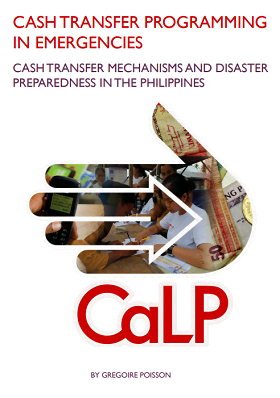
Cash transfer mechanisms and disaster preparedness in the Philippines
Report
The use of cash to deliver assistance in case of humanitarian emergency remains a relatively new approach in the Philippines, and aid agencies are at the early stages of developing guidelines, policies and organizational capacity to implement cash projects. Project managers lack support and guidance with...
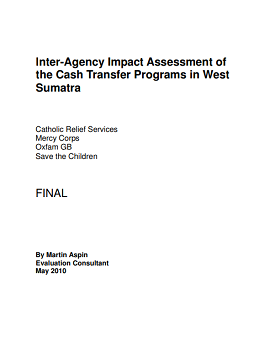
Inter-Agency Impact Assessment of the Cash Transfer Programs in West Sumatra
Case Study
Following the 2009 earthquake in West Sumatra, cash transfer programming (CTP) has proven successful in delivering a fast and effective recovery response—providing households the opportunity to recover shelter and basic needs for their livelihoods. Success of these CTPs has been supported well by the...
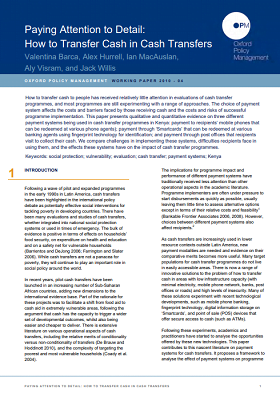
Paying attention to detail: How to transfer cash in cash transfers
Report
This policy working paper looks at various delivery mechanisms which can be used to transfer cash to people in cash interventions. It discusses how these affect the costs, and the barriers, faced by those receiving cash as well as the costs and risks to implementing agencies of successful programme...
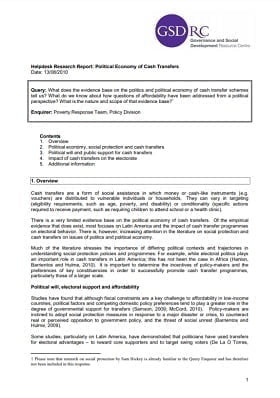
Helpdesk Research Report: Political Economy of Cash Transfers
Report
Cash transfers are a form of social assistance in which money or cash-like instruments (e.g. vouchers) are distributed to vulnerable individuals or households. They can vary in targeting (eligibility requirements, such as age, poverty, and disability) or conditionality (specific actions required to...

Comparing Cash and Food Transfers: a Cost-Benefit Analysis from Rural Malawi
Report
The Cash and Food for Livelihoods Pilot (CFLP) project was a cash and food-for-assets scheme implemented in southern Malawi over the eight months from October 2008 to May 2009, benefiting 11,100 households. CFLP was designed to prevent acute hunger and invest in disaster prevention and preparedness...
